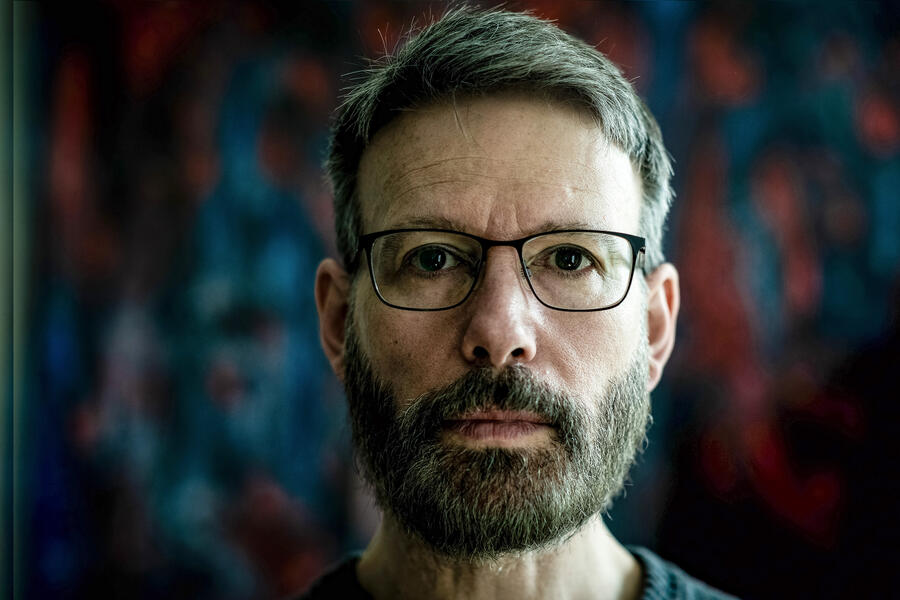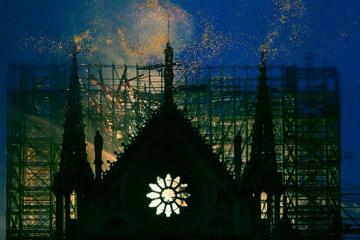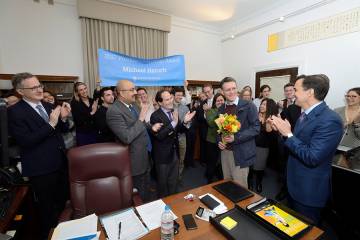When Shane McCrae decided to be a poet as a teenager in the early 1990s, language became both hope and tool, a way to navigate the world while thinking through his life on the page. His poems wrestle with personal traumas in language that captures the beautiful, haunting, and uncomfortable truths of being alive. Today, the celebrated poet and Columbia University writing professor's collections excavate his personal journey alongside entanglements with myth, history, and art that transform an individual experience into potent, mythopoetic terrain, as in these lines from "The Memoir":
My mother's parents knew you have to kill
The child with what you want the child to hate
McCrae's confessional, Miltonic, and profoundly contemporary verse provides the source material for Peabody Conservatory faculty composer Michael Hersch's new opera and we, each, which received its world premiere last month at the Baltimore Theatre Project and will be performed at the Hopkins Bloomberg Center in Washington, D.C., on Sunday, Oct. 13.
"One of the things that's unique about [McCrae's poetry] is his ability to navigate global and vast territories of human expression and experience through the prism of history and his own experiences," Hersch says, adding that he "does so in a manner that often provides explosive meaning to a given reader, not necessarily a meaning tethered to what those words might otherwise represent. He goes fearlessly into those often unexplored or underexplored areas of human nature. His ability to do that is quite unique."
Hersch's discerning eyes and ears have helped inform his intense engagements with poetry and visual art throughout his career, and his own work has never recoiled from the intense provocations and problems of being human. In his recent "The Harrowing and the Beautiful" essay for the Nautilus science magazine, he confesses that outside the work itself he sometimes struggles to articulate what his art is "about" when asked, and touches on a few themes running through his oeuvre, such as an engagement with violence from within (such as illness) or without, as in violence inflicted by individuals or groups onto each other. McCrae's writings polyphonously mine the physical, emotional, and psychological toil of such violence. In that essay, Hersch notes that the new opera is "above all an exploration of the treacherous territories of relationships—between individuals, within societies, and, ultimately, the collapse of both."
For the libretto, Hersch organized selections from three of McCrae's collections—The Gilded Auction Block (2019), Cain Named the Animal (2022), and The Many Hundreds of the Scent (2023)—into a new work. And where Hersch felt like there was something he wished to include that wasn't present in McCrae's published materials, he asked if the poet might consider writing new poetry. "The libretto took shape through the force of McCrae's often [Bruno] Schulzian imagery, though very much his own; wrenching one moment, shocking at others; gentle, elusive, or vulnerable at any turn," Hersch says. "The narrative that took shape seemed to be embedded there in the totality, like illuminated veins and capillaries that could be understood and perceived from a very personal vantage point. I was reminded of sculptor Christopher Cairns' interest in 'love … the love of humankind, even in its catastrophic relationship to where it is going.'
"When there was a space where I felt I needed something in particular regarding the libretto and the emerging narrative therein, I would ask Shane—he was so unbelievably generous to provide new poetry in these instances," Hersch continues. "It was a remarkable circumstance for me. It required a tremendous amount of trust on Shane's part."
McCrae is a music fan in general, and classical music, especially contemporary classical music, has been important to him ever since he decided to be a poet. He says he first started listening as a high school dropout who noticed the early 20th-century writers he admired were keyed into the classical music of their era, and he should similarly educate himself. McCrae became a Hersch fan when he bought an early Hersch CD, and soon noticed that Hersch's music was already seriously engaged with poetry, too.
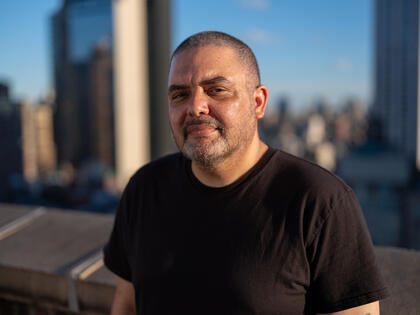
Image caption: Shane McCrae
Image credit: James Matthew Daniel
"The poetry he liked seemed to be the poetry I like, and I thought that was exciting," McCrae says. "As I sometimes do, I wrote him a fan letter, and we corresponded a little bit. His interest in doing the opera showed up maybe a decade later. And I have always enjoyed writing poetry to fit the requests of other people—I don't know why, I just really like doing that. I found that in trying to write to what Michael had asked me to write was fairly easy—at least it seemed like I was doing what he wanted me to do, so as a process it was really painless and just tremendously enjoyable."
And we, each is a two-act opera for two vocalists and a five-piece ensemble. The opera is produced by Mind on Fire, the Baltimore-based new music organization, with support from Johns Hopkins University, and stars baritone Jesse Blumberg and longtime Hersch collaborator and Peabody faculty soprano Ah Young Hong, Peab '98 (BM),'01 (MM), with musicians Emi Ferguson (flute), Andy Hudson (clarinet), Adda Kridler (violin), Leah Asher (viola), and Coleman Itzkoff (cello) conducted by Tito Muñoz.
Director and interdisciplinary artist James Matthew Daniel, like many of the and we, each creative team, has worked with Hersch before, directing Hersch's Agatha with Camerata Bern in 2020 and On the Threshold of Winter at Peabody and in Nashville in 2015, both of which starred the luminous, expressive Hong. "Directing an opera without a clear, linear narrative, like the one in this libretto, requires a lot of trust and collaboration from everyone involved," Daniel notes in an email. "For my part, I started by identifying themes and scouring the libretto for all the tangible little breadcrumbs that I could follow in my search for the action of the opera. With the addition of each designer, dancer, performer, I was given the opportunity to mine their creative interpretations of the piece and add more and more layers of meaning to our work.
"Instead of being confined to a traditional plot, we were free to dive into the emotional and thematic depths of each scene, crafting moments that resonate on a visceral level," he continues. "I felt encouraged by the fluid nature of the narrative to focus on mood, atmosphere, and the rich, poetic textures of the music and libretto. We didn't want to rest on ambiguity, though. I feel like we've grounded the story in very real emotion. As you'll see, the show is incredibly tactile and present, and Ah Young Hong and Jesse Blumberg give performances that are as complex and beautiful and haunting as the music."
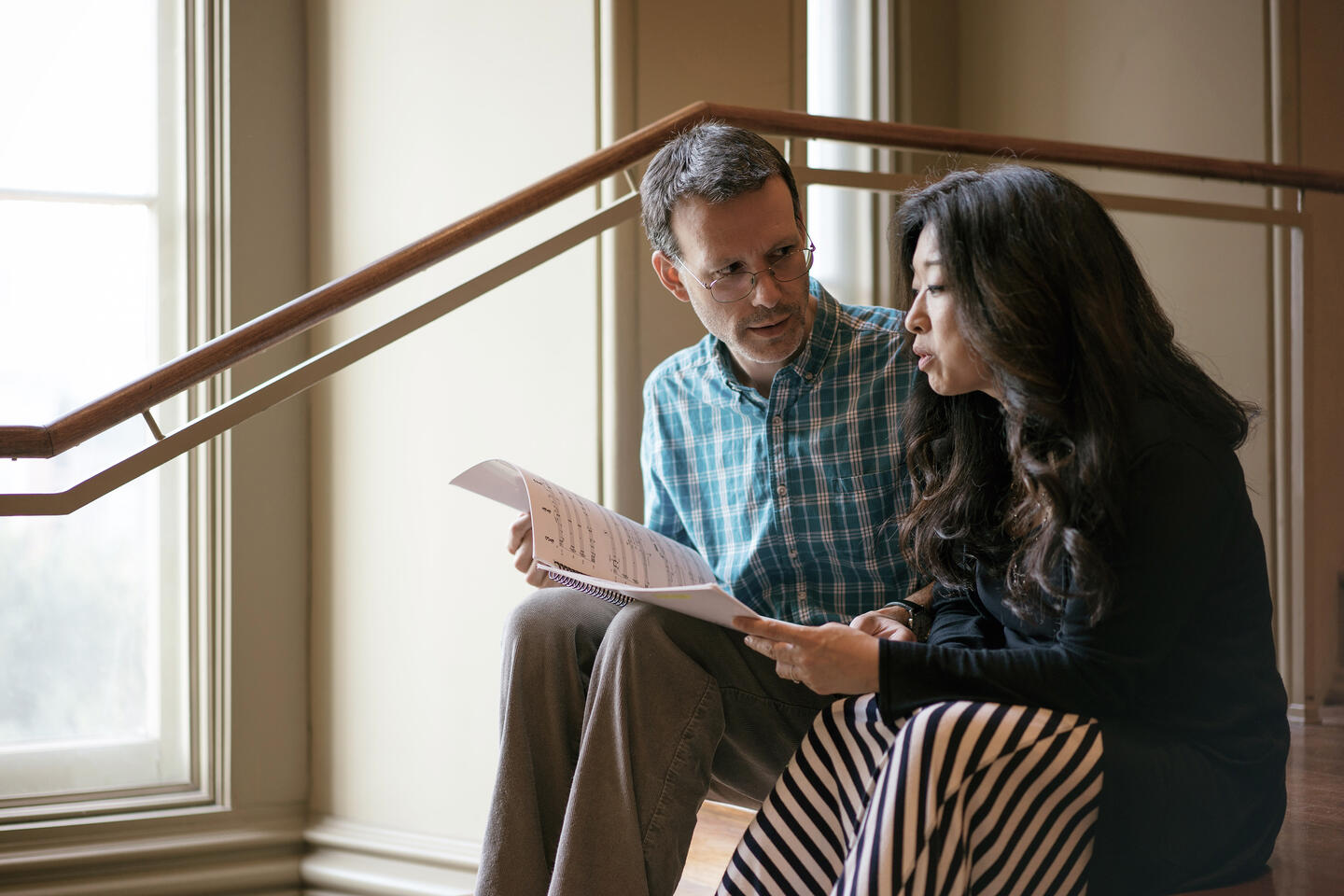
Image caption: Composer Michael Hersch and soprano Ah Young Hong in 2015
Image credit: Mike Maguire
Hersch came to Peabody as an undergraduate in 1992 and has been on the faculty nearly 20 years; remarkably, however, he hasn't premiered a new work in Baltimore since he was a student. Even two commissions from the Baltimore Symphony Orchestra debuted elsewhere: Arraché at the Strathmore Music Center in Bethesda in 2005, and the script of storms for soprano and orchestra in London in 2020.
"It has been many years since I have had a new work premiere in Baltimore," he says. "Baltimore is a remarkable city with a truly remarkable artistic life. It has always had that. The level of creativity I've seen and heard in this city over the decades is breathtaking. To have a work premiered here, and this opera in particular, is deeply meaningful to me."
Aiding that effort has been university support, such as the President's Frontier Award Hersch received from Johns Hopkins University in 2017, which has helped forge more meaningful relationships between Peabody and the Homewood campus. Hersch received the award amid a period of his career when, as he acknowledges in the aforementioned Nautilus essay, his creative output was moving more toward works for the theater and the voice—a shift he discusses by way of recalling something he observed when visiting the Metropolitan Museum of Art's Eugène Delacroix retrospective in 2018. He was waiting in line to view Delacroix's large-scale Médée furieuse, also known as Medea about to Kill her Children, which was installed with a small placard of descriptive exhibition text.
Many painting interpretations of the myth are terrifying. Delacroix's features a relatively calm if anxious adult woman with a child in each arm. One child looks little more than concerned, almost sleepy, the other more distressed. And though it takes a moment to notice, in the woman's left hand is a single, solitary dagger.
"There was a couple in front of me—I don't know what drew me to watching them, probably just proximity—but as they approached the painting the woman looked at it, gave it a once-over for a few seconds without reaction, and then read the description," Hersch recalls. "She then whipped her head to look back at the painting, turned back to the description, and she just let out this involuntary, unsettling sound of distress.
"She was clearly affected and deeply disturbed by this, and this happened over the course of a few seconds," Hersch continues. "For me as a composer, I feel I don't fully have that particular constellation of reactions at hand purely in or with sound. What I witnessed there interested me. The experience brought this point home.
"That is what continues to draw me to the theater—the engagement of the ear and the eye and everything else. It's a total sensory experience, and at this point in my life, I simply wish to explore this further."
Posted in Arts+Culture
Tagged opera, michael hersch




